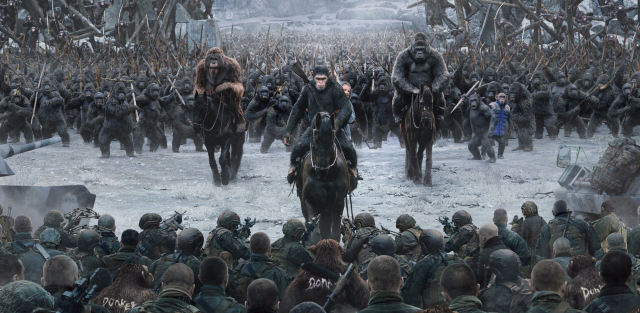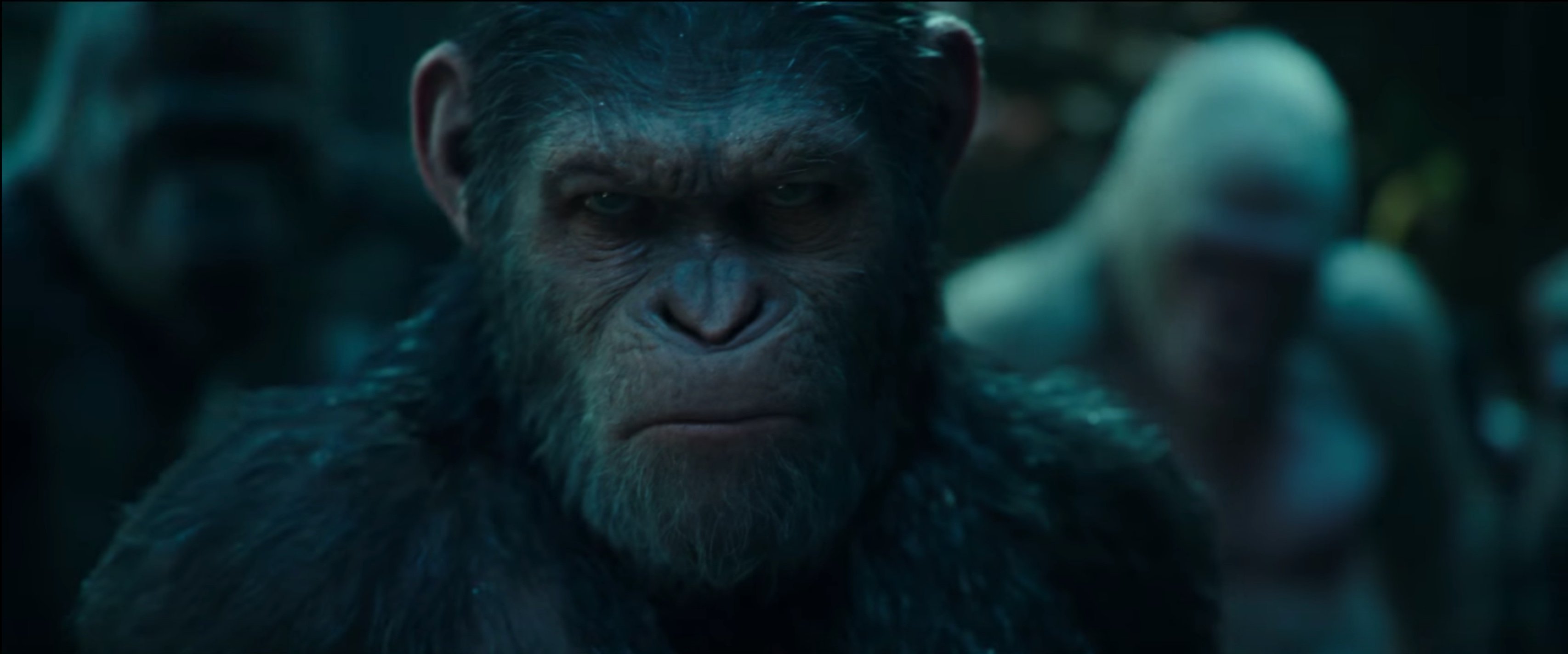Remember the Tim Burton Planet of the Apes movie starring Mark Wahlberg? No? Well, consider yourself lucky, buddy. Because that movie SUCKS. This new Planet of the Apes trilogy, however, is something special.
While most of the Planet of the Apes movies offer some form of enjoyment, this new trilogy, focused on something we’ve never seen before from this furry franchise – drama. Stop! Get your hands off the keyboard, Mister-too-quick-to-point-out-people’s-mistakes. I know that the other POTA movies have their fair share of dramatic moments too. So does Fast and Furious. That’s not my point. My point is, this new trilogy above all else focuses on the emotional journey of its central character, Caesar. And holy sh*t what an effing journey it has been.
The third and (presumedly) final chapter to this trilogy titled, War for the Planet of the Apes is a beautiful conclusion. But it’s important for me to point out something. 20th Century Fox kinda pulled a huge:
Con job.
They lied to you. Or at the very least, they did a damn good job in hiding the truth. This movie is titled WAR for the Planet of the Apes. Naturally, one would expect an EPIC Battle of Pelennor Fields styled SPECTACLE in which the Apes would finally destroy the asshole humans once and for all. Or at the very least, a Battle of the Bastards scale battle scene in which the apes (let me reiterate) knocks the bejesus out of the humans. Even marketing materials such as this poster (seen below) hinted at that.

DO NOT go into this movie expecting that. Because if you’re desperately clamouring for a spectacular APES VS HUMANS battle sequence, you’re going leave the cinema with the worst blue balls you’ve ever experienced. Random thought: What is the female equivalent to blue balls?
There is ONE battle sequence between the humans and the apes. It happens right at the start. The film opens with soldiers scouring the jungle trying to locate the apes’ hideout. “Donkey!” screams one of the soldiers. And we see an ape carrying weapons and equipment for the human soldiers. We soon find out that some apes are now being enslaved by the humans. My heart sinks. What follows is a short but glorious action sequence between the apes and the soldiers. And then the battle ends. And we don’t get to see an action heavy apes versus humans scene again. But what we do see, is even better.
Apes. Together. Strong.

“Justice is about harmony. Revenge is about making yourself feel better.”
I can’t remember if Mahatma Gandhi said it or Rachel Dawes in Batman Begins, but it has stuck with me since. In War for the Planet of the Apes, Ceasar goes through that internal struggle: Will he lead by example and do what’s right or will he let his emotions get the better of him and take revenge. If he chooses the latter, he essentially turns into Koba, the vengeful ape from Dawn of the Planet of the Apes. Will he embody the traits Martin Luther King Jr or Malcolm X? In one scene, Maurice – Ceasar’s wise and kind confidant – says, “you sound like Koba.” Who and why Ceasar wants to take revenge on, I will not say, but his internal struggle is perhaps the most interesting aspect of this story. Matt Reeves who penned the script alongside Mark Bomback does such a good job directing Ceasar, that we understand where he’s coming from even if we may not agree with every decision he makes. Will he pull the trigger (because of course there is a trigger to be pulled)? I think I would have done it.
I like movies where protagonists struggle with certain heroic decision making. Logan explored that in depth earlier this year with various characters, especially Dafne Keen’s Laura. There is a certain sense of discomfort to be felt every time Laura fearlessly rips the flesh of the bones of the villains. Sure they’re bad guys. She’s the hero. Shouldn’t you feel excited when a hero destroys a villain? You do. But knowing that she’s a little kid who would most likely prefer to ride an electrical pony outside a grocery store than kill someone, makes the situation complex. The same can be said about Ceasar in War for the Planet of the Apes. In one scene, he shoots a man. The man clearly deserves it. As an audience member, you would have liked to scream, “Take that, bastard!!” But Ceasar’s face, laden with regret and disgust makes you feel differently. Here’s someone who lives every day trying to lead a life without violence only to be forced into it over and over and over again.
Donkey!

Check out an excerpt from Clara Davis’ 1937 poem on slavery.
White folks, I want to see the boats passing up and down the Alabammy river and hear the slaves singing at their work.
I want to see dawn break over the black ridge and the twilight settle over the place spreading an orange hue.
The poem talks about slaves wanting to go back to their lives of slavery because of certain so-called privileges that came with it. Of course, this is a crazy notion that most African Americans will frown upon. But from a literary standpoint, it is indeed an interesting idea to think about.
Matt Reeves plays with this idea (sorta) in War. I previously mentioned how my heart sank knowing that there are now apes being enslaved by the humans. Humans are absolute trash, don’t you think? We spend years experimenting on apes to make them smarter, only to fear them and as a result, enslave them when they DO become smart.
It’s a real punch to the gut when we uncover how many of these apes CHOSE the life of slavery in fear of the humans winning the war. Instead of choosing to stand by their fellow ape brethren, some of these apes choose to backstab and betray their family and be donkeys. Can we really blame them, though? It’s easy to say “stand and fight! Don’t be a coward.” But, think about it for a moment. Imagine a situation where racism is at a Hitlerian level. You’re living every second of your life looking over your shoulders because the dominant race wants to kill everyone that shares your skin colour. You and your family might die at any given moment. Would you stand and fight? Or would you choose relative safety and a life of slavery?
Oi Michael Bay! Take note.

Why does the Transformers franchise put so much emphasis on the human characters? Why do Sam Witwicky’s annoying parents have more screen time than any Transformer not named Bumblebee or Optimus Prime? Supporters of Bay’s garbage franchise will say that it’s difficult to connect and relate to a movie like Transformers without prominent human characters.
To that, the new Planet of the Apes trilogy says, “STFU and shove a rod up your a*s.”
War for the Planet of the Apes (Rise and Dawn too) has hardly any human characters. We can relate to the apes because they’re given human-esque characteristics. These are animals. And other than Ceasar and a couple of others, most of these apes are not even able to verbalise their thoughts in a human language. Instead, they communicate via sign language. In fact, for the most part, Matt Reeves does not even focus on the hand gestures, choosing instead to linger on the apes’ facial gestures. Yet, we’re able to connect with them on every level. I understand and feel for the ape Winter, who has less than 15 minutes of screentime than I am Mark Wahlberg in TWO WHOLE Transformers movies. Now, that is how you write characters. Planet of the Apes is an excellent clinic on humanising non-human characters.
So, will this end up being my top 5 favourites of the year? Probably not.
Pacing issues and tales of a bald headed dude.

Boy did Matt Reeves drop the ball big time with Woody Harrelson’s Colonel. The character started strong. When we’re first introduced to Colonel, he does such disgusting acts, we immediately hate him. Somewhere in the second act, the cinema turned pin drop silent when Colonel delivers a monologue. It was passionate, quiet, subtle and bloody damn excellent. Woody Harrelson is magnetic. With every growing second, we hate the son of a b*tch even more. He’s a piece of sh*t and I desperately wanted Ceasar to beat him till his face is nothing but an ugly mix of splattered blood and broken teeth. But, because of the flawless writing, we understand where he’s coming from.
And then…. nothing.
Besides a couple more acts of violence, the character doesn’t do anything remotely interesting or impactful. And then it ends? This has got to be one of the most disappointing character arcs in recent memory. Note, I say disappointing, not, bad. It’s disappointing because of how strong the character is at the beginning only to end in such an underwhelming manner. Perhaps it’s not so much how the arc ends but the journey towards the end that felt rushed. It’s almost as if it DIDN’T DESERVE the poetic end that the character essentially received. It’s not Harrelson’s fault, but the writing.
Heck, the entire third act sorta just happens. Again, it isn’t horrible, not even close. But given the emotional high the first and second act leaves us, the third act offers merely an average payoff. The FINAL shot, though, will leave a lasting impression.
Matt Reeves is an absolute badass. His work on Dawn of the Planet of the Apes showed the world that he has a bright career ahead of him. In War for the Planet of the Apes he proves it once again. With cinematographer Michael Seresin by his side, Reeves has crafted one heck of a beautiful movie both in terms of storytelling and aesthetics. Every single shot in this movie has a purpose. Every single shot tells a story of its own.
A few things suddenly came to mind:
1. Just like in Rogue One: A Star Wars Story, Michael Giacchino composed a good-enough but generally forgettable soundtrack.
2. This is Andy Serkis’ best performance to date. Will he (or should he) get an Oscar nomination for his motion capture performance as Ceasar?
3. You should definitely catch War for the Planet of the Apes when it hits cinemas on 13 July 2017 even if it means spending the money your grandma gave you to buy groceries.
Ps: I just Googled it. The female equivalent to “blue balls” is “blue bean.” How interesting.






